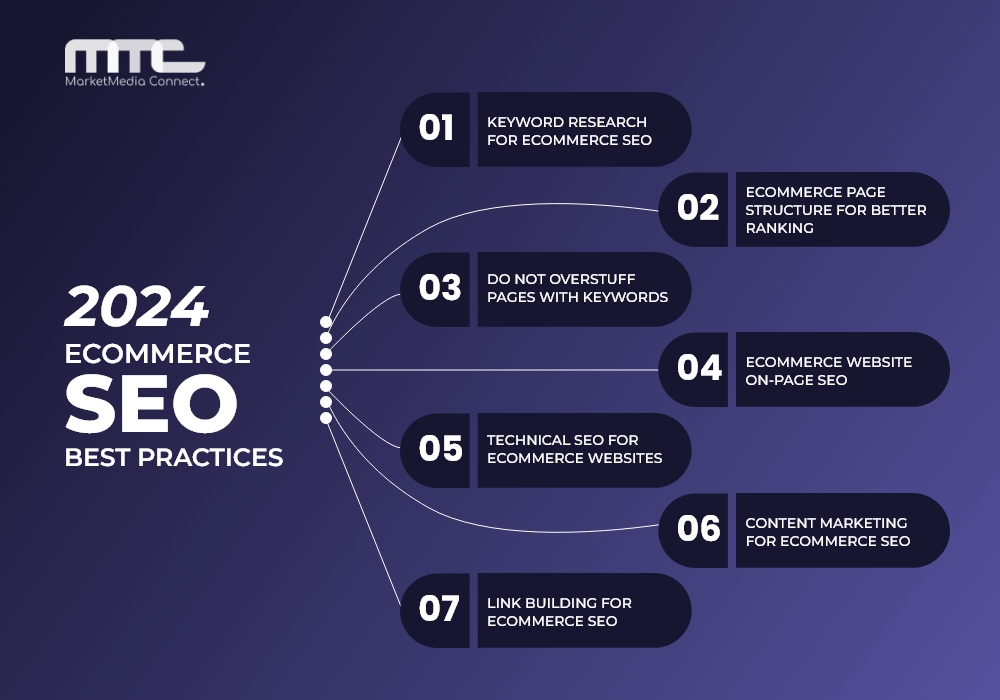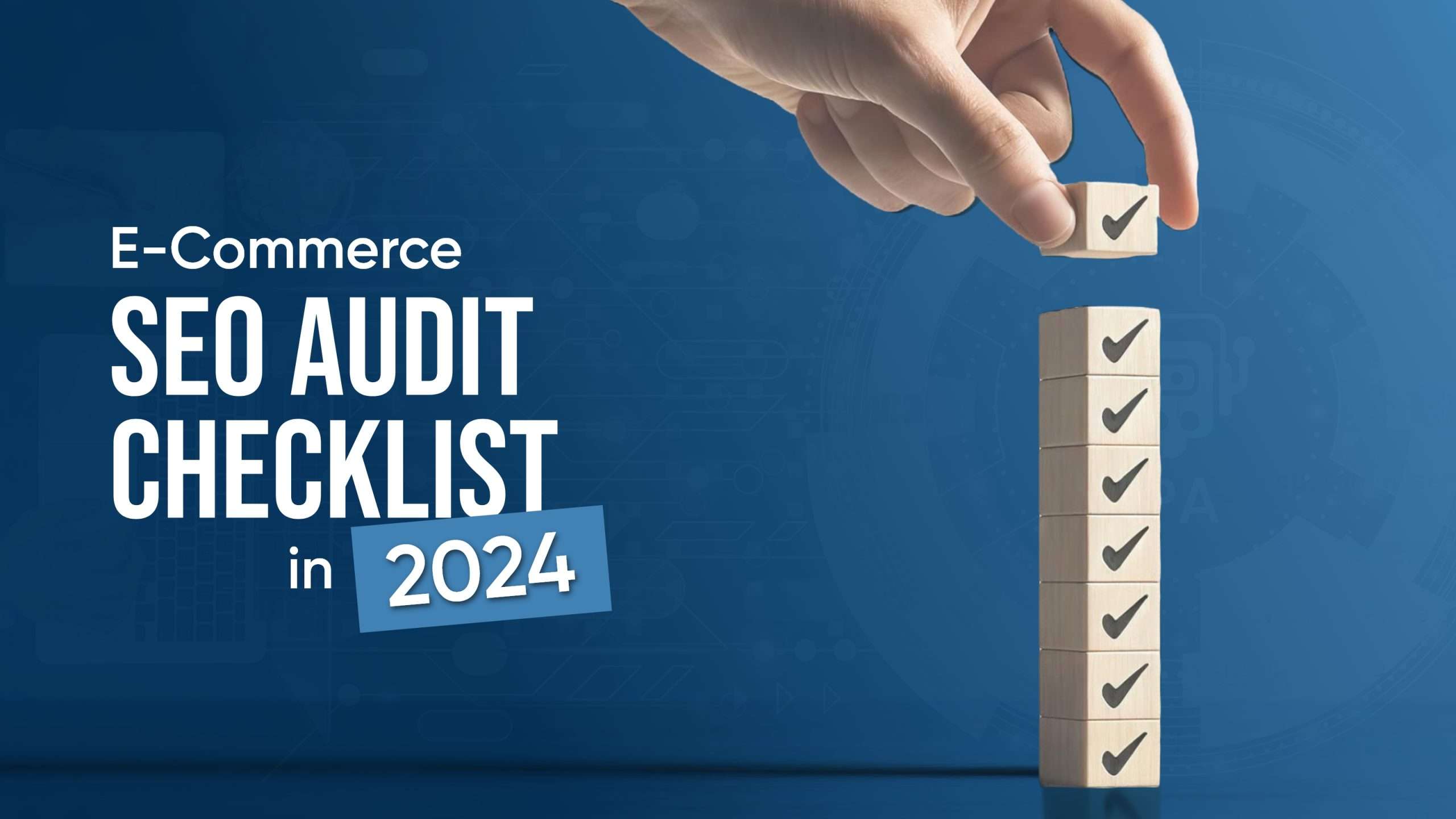Content
The Ultimate eCommerce SEO Best Practices Guide for 2024
If you are an eCommerce website owner, you understand the significance of eCommerce SEO. This guide has been put together to assist in increasing the visibility of your eCommerce website, given how online shopping continues to expand with voice searches and mobile phone usage. That is why increasing the website’s online visibility is vitally important.
Use this as an eCommerce SEO checklist or guide. To maximize sales, utilize the SEO strategies listed below; this guide will equip you with proven techniques to increase organic traffic to your e-commerce store.
What Is eCommerce SEO?
eCommerce SEO refers to optimizing an online store to rank higher in search engine result pages (SERPs). While traditional SEO tactics typically focus on driving organic traffic to your Site, eCommerce SEO aims to turn visitors into customers rather than get more visitors in.
Approaches and practices used to optimize websites effectively include increasing loading speeds and mobile friendliness; search engines use these aspects to rank online stores – in eCommerce, always consider what the user wants before optimizing for search.
Why Is SEO Necessary for eCommerce Websites?
As someone new to Search Engine Optimization (SEO), you must understand its significance for eCommerce websites. SEO plays an essential role in assuring the presence of your online store – with it, potential customers will find you, leading to sales. What SEO achieves are as follows:
- Increased Visibility: SEO increases visibility by ranking higher in search engine results, making your products/services more likely to be discovered by potential buyers.
- Targeted Traffic: Best SEO practices for eCommerce websites attract those actively searching for what you offer, increasing conversion chances.
- Affordable Marketing: SEO’s organic traffic generation method is more sustainable and cost-effective in the long run than paid ads.
- Competitive Advantage: With more consumers starting their buying journey online, a well-optimized website can give your company an advantage over competitors who neglect SEO.
- User Experience Enhancement: SEO goes beyond pleasing search engines; it also involves making websites user-friendly. This results in more satisfied clients and recurring business.
- Long-Term Growth: SEO contributes to your online business’s long-term development and sustainability, driving its long-term expansion and success.
Let us now examine ways in which you can optimize your eCommerce website.
2024 eCommerce SEO Best Practices

Below are recommended practices and tactics for creating an effective SEO eCommerce strategy in 2024 to reach a wider audience and generate more sales.
Keyword Research for eCommerce SEO
Researching relevant keywords is integral to optimizing an eCommerce website for search engines.
Keyword research involves looking for keywords and phrases your customers use when searching for products you sell online. Remember how we said earlier that everything is about user intent? You must search for keywords depending on the intent of those who are seeking for them. As an online store owner, you’re after people at the bottom of your sales funnel with commercial intentions.
Don’t worry – with AI at our fingertips, searching keywords doesn’t need to be time-consuming; ChatGPT makes the task easy in minutes! Additionally, tools like Ahrefs and SEMRUSH offer extensive keyword information.
Here are a few strategies for conducting effective keyword research for your SEO eCommerce strategy:
- Understanding Your Audience: Understanding your target audience’s search behaviour is paramount when browsing products online. Consider their requirements, preferences and language used when shopping. Google Keyword Planner and SEMrush provide invaluable insights on relevant terms within your industry.
- Long-Tail Keywords: These are more precise, longer-tail keywords with lower competition that typically have more excellent conversion rates. Instead of targeting “shoes,” try targeting something like “women’s running shoes for flat feet”.
- Analyzing Your Competitors: Examining which keywords your competitors rank for can give valuable insight into market trends and help identify potential keyword prospects for your Site.
- Integrating Keywords Into Content: Once keywords have been selected, incorporate them naturally and improve user experience by including them in product titles, descriptions, blog postings and meta tags. Make certain that the usage is natural and improves the user experience.
- Seasonal Trends: Be aware of seasonal trends and adapt your keyword strategy accordingly – for instance, targeting “Christmas gifts for dad” when the holiday season nears would be an effective strategy.
- Local Keywords: If your eCommerce shop services specific locations, add local keywords into its strategy plan.
Do Not Overstuff Pages with Keywords
Keywords are an integral component of SEO; however, overuse (known as keyword stuffing) could damage your eCommerce website’s search rankings. Here are some suggestions for effectively using keywords in content:
- Natural Keyword Integration: Ensure keywords are integrated naturally into the content. Keywords should enhance readability and quality rather than detract from it.
- Synonyms and Related Phrases: To minimize duplication and extend your reach in search engine results, utilize synonyms and similar phrases.
- User-Centric Content: Always aim to write with the reader in mind when creating content, answering user queries and adding value will outperform content that has only been optimized for search engines.
- Avoid Over-Optimization: Be wary of over-optimizing your content. If a page reads awkwardly or feels forced, chances are it has been over-optimized.
eCommerce Page Structure for Better Ranking
A well-structured website is critical to both user experience and search engine optimization; site structure can increase search engine rankings, enhance user satisfaction for online eCommerce businesses, resulting in increased sales.
Search engines find it easier to crawl websites with an easily navigable structure. In contrast, users find what they need more quickly if your eCommerce store features clear hierarchies and accurate menus.
Here are a few suggestions for improving the structure of your website:
- Structure your Site Properly: Create a clear site structure that groups items and categories logically for improved user navigation and enables search engines to index it more effectively.
- Descriptive and Clean URLs: For optimal performance, create short and descriptive URLs and include relevant keywords, such as using “/women-running-shoes” instead of “/product12345” when setting up links.
- Breadcrumb Navigation: Use breadcrumb navigation to enhance user experience and fortify the structure of your website for search engines.
- Mobile Optimization: As mobile searches increase, make sure your website is mobile-friendly. Google’s ranking algorithm considers this factor.
eCommerce Website On-Page SEO
On-page SEO is optimizing individual web pages so they rank higher in search engines.
eCommerce SEO places greater emphasis over on-page SEO implementation than traditional SEO, given that an eCommerce store contains numerous products with individual pages for them. As a result, on-page SEO plays a crucial role in eCommerce SEO strategies.
On-page SEO refers to any process undertaken on your website to enhance its elements, such as images, alt tags, meta titles and descriptions. On-page SEO encompasses anything done within website to increase its visibility.
Here are some helpful tips to boost the on-page eCommerce SEO:
- Product Descriptions and Titles: Write eye-catching product descriptions and titles using primary keywords without overusing them. Avoid keyword stuffing!
- Image Optimization: When optimizing images for search, choose high-quality photos with descriptive file names and ALT tags containing relevant keywords.
- User Reviews and Ratings: Involve users in providing reviews and ratings that create unique content while building credibility, which can boost SEO efforts.
- Internal Linking: Internal links should be utilized strategically to assist search engines in discovering new pages on your Site and spread page authority throughout.
Technical SEO for eCommerce Websites
Optimizing an eCommerce website’s technical SEO is essential to ensuring search engine crawlers can access and understand it. You can boost its technical SEO by:
- Site Speed: Improve your site’s loading speed, which is important for both SEO and user experience.Image optimisation, CSS and JavaScript minification, and the use of a content delivery network (CDN) are all techniques that can be used to improve loading speed.
- Responsive Design: Ensure your Site offers an enjoyable user experience on all devices – particularly smartphones and tablets.
- Secure Website (HTTPS): For optimal website security, consider employing HTTPS encryption when handling sensitive client data.
- Crawl issues: To ensure all pages are indexed appropriately, regularly inspect Google Search Console for crawl errors and correct them as soon as they occur. This ensures all critical pages will be indexed.
Content Marketing for eCommerce SEO
Content marketing can drastically boost eCommerce SEO by engaging customers and drawing them in. Because customers find your Site through your content, content is often called the king of SEO; without it, your site won’t rank.
Search engines learn about your website’s products through content, and they show your eCommerce store to consumers who search for terms that appear on your website. Content marketing is the practice of distributing your content in many formats and across several platforms. You can produce the following types of content:
- Blog Posts: Write blog posts regularly about your products and industry to educate customers and insert keywords and internal links. Doing this allows customers to stay up-to-date and gives you another opportunity to add SEO keywords into each post for additional search engine ranking opportunities.
- Buying Guides and How-to Articles: Include buying guidelines, how-to articles, product tips and any other educational content relevant to your niche on your website as an invaluable knowledge resource for visitors in that field. This will further strengthen its position as a knowledge resource in its niche market.
- Video Content: Add video content, reviews or behind-the-scenes footage to your Site for greater engagement and browsing time, which act as indicators to search engines.
Link Building for eCommerce SEO
Link building is an integral component of off-page SEO, helping to elevate your site’s authority and rankings. Links serve as trust votes from other websites pointing back to you, giving search engines proof that your content has value. When your backlinks come from respected sources in your niche, search engines recognize this signal that your content must have some merit.
Here are a few pointers for creating links for your eCommerce store:
Prioritise Quality Over Quantity: Prioritize building high-quality links from credible websites within your niche rather than massing multiple low-grade ones together. One high-quality link is more valuable than multiple low-quality ones.
Guest Posting: Writing and publishing content on other credible blogs or websites is known as guest posting, which generates backlinks for your website and exposes it to a greater audience.
Partnerships with influencers: Join influencers to produce content that naturally refers to your products or website.
Build Broken Links: Locate broken links on relevant websites and provide your material as replacements.
Local SEO tactics: When applicable, use local SEO tactics, such as business listings and community involvement, to build local backlinks.
Final Thoughts
eCommerce SEO doesn’t need to be complex; focus on the areas discussed here. AI can assist with understanding user intent and automating tasks within your SEO strategy.
Remember that eCommerce SEO is an ever-changing and evolving process, necessitating constant adjustment and adaptation to changing search engine algorithms and user behaviour.
If you need assistance, reach out to our SEO specialists.










